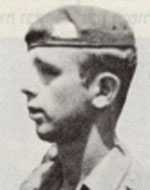Burstein, Shalom
Shalom (Shlomke), son of Aliza and Zvi, was born on 24.4.1952 in Hadera. He studied at the Bialik Elementary School in Netanya and then completed his studies at the Bar-Ilan religious high school in Netanya. He was a diligent student and loved by his teachers and friends, and was characterized by three main qualities: diligence, depth and love of learning. He never let the subject matter until he understood it. Among his friends he excelled in his leadership ability. His educator relates that his leadership stemmed from his being a central figure in every event in the class and from his willingness to fight with his elders in every matter that he felt was right in his trial. In every such struggle it was clear to everyone that he was acting out of deep conviction and a belief in his righteousness. In his parents’ home, Shalom was educated in the tradition and values of Judaism, which he also imparted to his friends. One of his friends said: “Shalom lit my way to Judaism, the path to repentance, and made an important turning point in my life, in attracting me to the religious high school named for Rabbi Meir Bar-Ilan.” Shalom was a social man and pleasant-talker, active and active at every meeting and every party he organized. He was much involved in public activity among the youth, and when he was in the seventh grade, he was among the members of a delegation that went to visit youth in Europe. Shalom was drafted into the IDF in mid-November 1970 and assigned to the Armored Corps. He excelled in the course and was awarded a high grade (90). His commanding officer in the course testified that his professional proficiency was surprising and his control over the technical subjects was exemplary because of his familiarity with the subjects, his responsibility and his meticulousness at work. Had served for the past two years as chief clerk in the triad of his armored battalion. He was accepted to the Hebrew University of Jerusalem in the Faculty of Social Sciences – Economics and International Relations. For this purpose, his commanders gave him an early release that would have been six days after he had fallen in battle. On his release certificate, his commander said: “An excellent commander with excellent organizational skills and initiative, disciplined, punctual, resourceful and dedicated, he has fulfilled his duties thoroughly. In the days leading up to the war, Shalom was on leave. When the fighting broke out, he immediately returned to the base and asked to volunteer to serve as a liaison. His request was denied, and he worked for two days to convince his commander that it suited him. On the 13th of Tishrei 5734 (9.10.1973), in a battle that took place northwest of Kuneitra, his tank was hit directly and Shalom was killed. He was brought to eternal rest in the cemetery in Netanya. Survived by his father, mother and two brothers. After his fall, he was promoted to the rank of sergeant. In a letter of condolence to the bereaved family, his commander wrote: “Shalom proved himself to have a great ability and professional ability to lead his subordinates in the face of the Syrian enemy.” And his friend wrote: “His image continues to accompany his many friends and serves as a symbol of courage, a sense of responsibility and volunteerism and professional reliability.”
